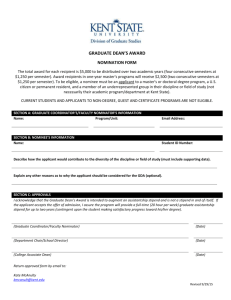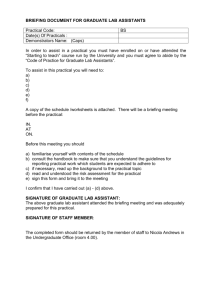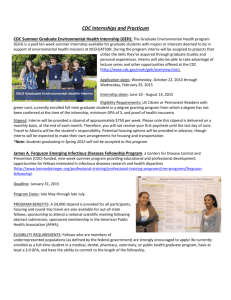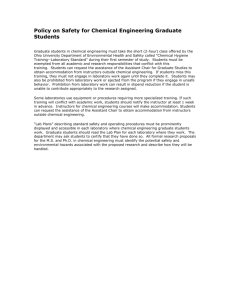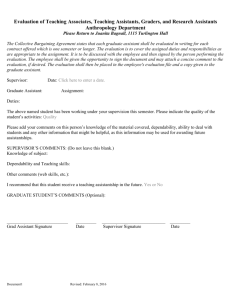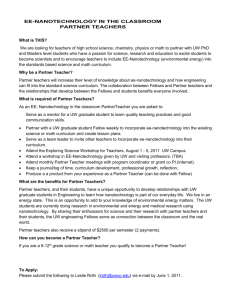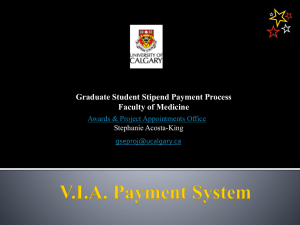Graduate Student Stipends - University of Alaska Anchorage
advertisement
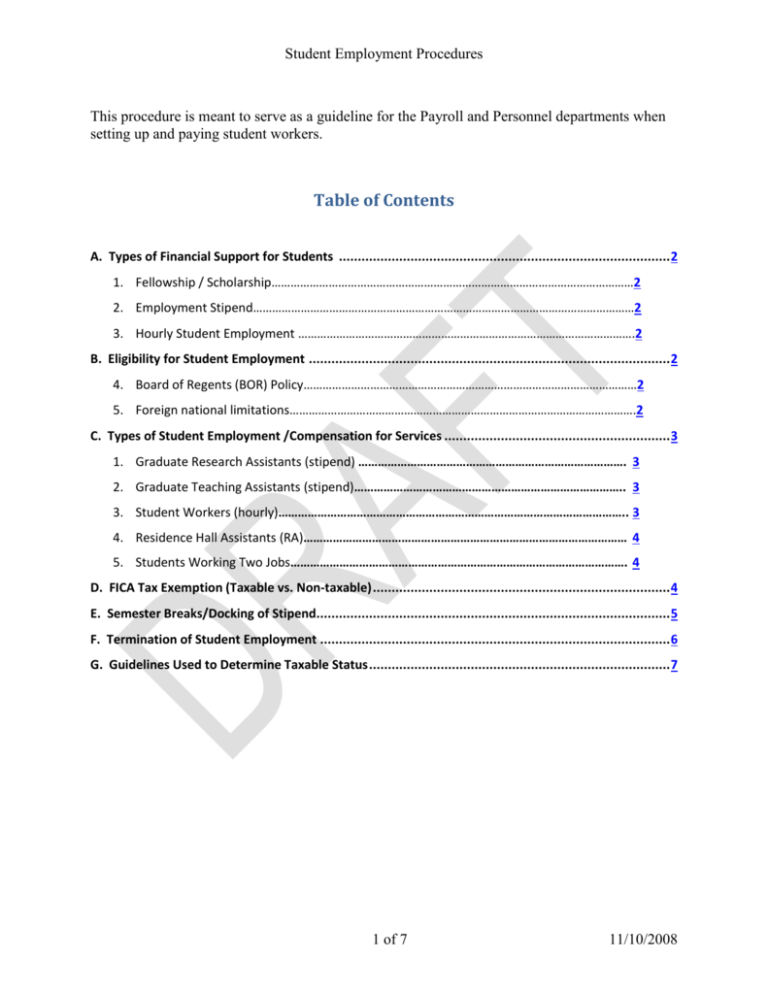
Student Employment Procedures This procedure is meant to serve as a guideline for the Payroll and Personnel departments when setting up and paying student workers. Table of Contents A. Types of Financial Support for Students ........................................................................................ 2 1. Fellowship / Scholarship……………………………………………………………………………………………………2 2. Employment Stipend…………………………………………………………………………………………………………2 3. Hourly Student Employment …………………………………………………………………………………………….2 B. Eligibility for Student Employment ................................................................................................ 2 4. Board of Regents (BOR) Policy……………………………………………………………………………………………2 5. Foreign national limitations……………………………………………………………………………………………….2 C. Types of Student Employment /Compensation for Services ............................................................ 3 1. Graduate Research Assistants (stipend) ………………………………………………………………………. 3 2. Graduate Teaching Assistants (stipend)……………………………………………………………………….. 3 3. Student Workers (hourly)…………………………………………………………………………………………….. 3 4. Residence Hall Assistants (RA)……………………………………………………………………………………… 4 5. Students Working Two Jobs…………………………………………………………………………………………. 4 D. FICA Tax Exemption (Taxable vs. Non-taxable) ............................................................................... 4 E. Semester Breaks/Docking of Stipend.............................................................................................. 5 F. Termination of Student Employment ............................................................................................. 6 G. Guidelines Used to Determine Taxable Status ................................................................................ 7 1 of 7 11/10/2008 Student Employment Procedures A. Types of Financial Support for Students 1. Fellowship / Scholarship A payment made to students whose purpose is to complete studies but no service element is defined. The two words, fellowship and scholarship, are used interchangeably by the Internal Revenue Service (IRS) to refer to both taxable and non-taxable payments to students. Fellowships/Scholarships are paid through Accounts Payable (A/P). See Graduate Fellowship or Thesis Completion contract letter (http://www.alaska.edu/hr/labor/nonrep/word/grad_thesis_complete.doc). 2. Employment Stipend A lump sum of money, as per the amount specified in a contract, paid to a student over a set period of time for teaching or research, in order to complete some degree requirement. An employment stipend represents a salary where a service element is defined (employment). Students may be paid by stipend only as specified below (Graduate Research Assistants and Graduate Teaching Assistants who are not paid through Federal Work Study). All other student workers, except Resident Hall Assistants, must be paid hourly. Employment stipends are paid through Payroll. 3. Hourly Student Employment Hourly positions must receive minimum wage and overtime at one and one half times the regular rate of pay. Hourly employment is paid through Payroll. B. Eligibility for Student Employment 1. UA Board of Regent’s Policy P09.05.020 (http://www.alaska.edu/bor/policy/09-05.doc) states that in order to be eligible for student employment, graduate and undergraduate students must be enrolled in a minimum of six credit hours in the current semester of employment or have been enrolled the preceding semester for six or more credit hours, and demonstrate plans to enroll for six or more credit hours in the next semester for employment between semesters. For graduate research and teaching assistantships, please contact the MAU graduate office for minimum credit requirements. 2. Foreign nationals on temporary student visas may work up to 20 hours while classes are in session per limitations of the visa regulations [8 CFR 214.2(f)(9)(i)]. They are not eligible for waivers to work over 20 hours while classes are in session. Students who violate this restriction have violated their immigration status and are required to leave the U.S. immediately. The university is required by law to report to U.S. immigration authorities when a student is “out of status.” Consequences may also include denial of re-entry to the U.S., inability to move from undergraduate to graduate status, denial of requests for practical training, denial of request to change visa status, and possible denial of all future visa applications. On campus employment may be full-time during summer and other vacation periods for students who are eligible and intend to register for the subsequent academic term. 2 of 7 11/10/2008 Student Employment Procedures C. Types of Student Employment/Compensation for Services 1. Graduate Research Assistants (stipend) – GN/GT ECLS: Graduate students performing research in the course of fulfilling requirements of an advanced degree, under faculty supervision, who are paid a stipend for work performed (normally performed while they are obtaining the advanced degree). Graduate Research Assistants are not considered for purposes of FLSA to have an employee-employer relationship; therefore, no application of the minimum wage and overtime pay provisions of the FLSA are necessary. Graduate Research Assistants paid through Federal Work Study must be paid minimum wage. Therefore, they must be treated as hourly non-exempt Student Workers and not paid by stipend. The IRS considers the stipend as compensation for services; thus, these payments must be paid through Payroll. If the stipend is charged to a restricted fund grant, the percent of effort must be tracked for grant effort reporting. See RA - Not Work Study contract letter (http://www.alaska.edu/hr/labor/nonrep/word/ra_not_workstudy.doc). 2. Graduate Teaching Assistants (stipend) – GN/GT ECLS: Graduate students teaching courses whose primary duty is teaching, tutoring, instructing, or lecturing in the activity of imparting knowledge. Graduate Teaching Assistants are exempt under the “teaching professional” exemption of the FLSA; therefore, no application of the minimum wage and overtime pay provisions of the FLSA are necessary. Federal law requires that students paid through Federal Work Study (FWS) be paid minimum wage. Graduate Teaching Assistants paid through FWS must be treated as hourly non-exempt Student Workers and not paid by stipend. Paper graders do not qualify as Graduate Teaching Assistants and must be treated as nonexempt Student Workers. If the stipend is charged to a restricted fund grant, the percent of effort must be tracked for grant effort reporting. See TA - Not Work Study contract letter (http://www.alaska.edu/hr/labor/nonrep/word/ta_not_workstudy.doc). 3. Graduate Research Assistants and Teaching Assistants on Federal Work Study (hourly) – SN/ST ECLS: See RA/TA - Work Study, Contract Letter contract letter (http://www.alaska.edu/hr/labor/nonrep/word/ra-ta_workstudy_contract_ltr.doc). 4. Student Workers (hourly) – SN/ST ECLS: These students can be undergraduate or graduate students. Includes graduate students who have requirements other than teaching or research duties that are specified in their contract as a condition of completing their degree program. 3 of 7 11/10/2008 Student Employment Procedures Includes all students paid through Federal Work Study. Students who are paid on an hourly basis are not exempt under the FLSA; they are subject to the minimum wage and overtime pay provisions of the FLSA. If the stipend is charged to a restricted fund grant, the percent of effort must be tracked for grant effort reporting. Examples: General office work, basic computer programming, service, maintenance, graduate students on paid practicum, etc. 5. Residence Hall Assistants (RA) – SN/ST ECLS: RA Benefit – Students serving as live-in residential assistants, mentors, and advisors who are participants in a bona fide educational program and receive remuneration in the form of reduced room or board charges, free use of telephones, tuition credits, and the like, are not employees under the FLSA. RA benefits are not considered taxable income. The RA benefit is tax free since this benefit is provided to the student for the convenience of the University, the meals are furnished on the University premises, and the RA is required to live in an assigned room in the dormitory as a condition of their benefit. Any payments in addition to those listed above must be paid through Payroll. RA Compensation – RAs who provide additional services, such as manning the front desk, in anticipation of some compensation (money, meals, etc.) are generally considered employees under the FLSA; the minimum wage and overtime pay provisions of the FLSA would apply to these services. The RA should be paid for the additional services on an hourly basis. If the RA has an option to receive either additional compensation for the lodging or the lodging itself or performs other duties for additional compensation, then the amount of the optional additional compensation is included in taxable income. 6. Students Working Two Jobs: Students holding two jobs that are classified differently for FLSA purposes (for example, one job is normally exempt and the other is normally non-exempt) should be referred to the MAU Human Resources office for exempt status determination. D. FICA Tax Exemption (Taxable vs. Non-taxable) Student employees generally are exempt from both Medicare and OASDI taxes (i.e. FICA taxes) when employed during the academic year. However, in order to qualify for this exemption, students must meet certain requirements. These requirements relate to the number of credit hours in which the student is enrolled, the number of hours the student works, and the specific position that the student employee occupies. Note that this exemption applies only to UA students employed by UA. UA students working for other employers are not exempt from FICA taxes. Students enrolled at other schools or universities, but working for UA, also are not exempt from FICA taxes. Credit Hours o According to the IRS, a student must be enrolled at least half-time in order to qualify for the FICA exemption. For undergraduates, "half-time" is 6 credit hours and for graduates, 4 of 7 11/10/2008 Student Employment Procedures "half-time" is 4.5 credit hours, regardless of the academic term. Students are also deemed to be half-time if they are in their last semester of a course of study but require at least two semesters to complete the requirements for obtaining a degree, certificate, or other recognized educational credential. UA Board of Regent’s Policy P09.05.020 (http://www.alaska.edu/bor/policy/09-05.doc) states that in order to be eligible for student employment, graduate and undergraduate students must be enrolled in a minimum of six credit hours in the current semester of employment, have been enrolled in the preceding semester for six or more credit hours, and demonstrate plans to enroll for six or more credit hours in the next semester for employment between semesters. Number of Hours Worked o A student who works more than 20 hours per week, except during breaks or between academic terms lasting less than five weeks, will not qualify for the FICA tax exemption. According to the UA Board of Regent’s Policy P09.05.030 (http://www.alaska.edu/bor/policy/09-05.doc), student employment will normally not exceed 20 hours per week during a semester or 40 hours per week between semesters or during summer sessions. Regular and reoccurring exceptions to this schedule must be made in writing and approved in advance by the MAU chancellor or his/her designee. Notification of approved exceptions must be sent to the MAU Human Resources office. The MAU chancellor or designee can only approve a workload of more than 20 hours and cannot approve whether the student qualifies for the FICA tax exemption. If a student is approved to work more than 20 hours, the student will not qualify for the FICA tax exemption. The only exception is when a student works more than 20 hours during breaks or between academic terms lasting less than five weeks. Foreign nationals on temporary student visas cannot work more than 20 hours while classes are in session per limitations of the visa regulations [8 CFR 214.2(f)(9)(i)]. These students are not eligible for waivers to work over 20 hours while classes are in session. On-campus employment may be full-time during summer and other vacation periods for students who are eligible and intend to register for the subsequent academic term. Students may be employed full-time during breaks or between academic terms lasting less than five weeks and maintain their FICA non-taxable status so long as they are eligible and intend to register for the subsequent academic term. Type of Position o In order to be exempt from FICA taxes, the student cannot be employed in a position that would normally be classified as "career employment." This means the student cannot be in a full-time position or working full-time because such services are not incident to and for the purpose of pursuing a course of study. The student cannot be in a “professional” position or one that is eligible for benefits and still be FICA exempt. E. Semester Breaks/Docking of Stipend 5 of 7 11/10/2008 Student Employment Procedures Graduate Research Assistants and Graduate Teaching Assistants are paid the stipend amount specified in the appointment letter regardless of hours worked. If the appointment letter covers multiple semesters and the department does not intend to pay the student for Christmas break, the appointment letter should specify the time periods when the student is entitled to compensation. It is recommended that the appointment letters be completed on a semester-by-semester basis and not cover any breaks between semesters. Stipends may be docked only under extenuating circumstances and with the approval of the MAU HR director. Job Assignment Recommendations If paying a student for more hours worked during Christmas break, spring break, etc., add additional earnings to timesheet. Attach memo from the department. If not paying a student during Christmas break, have a job form and fall appointment letter that end prior to the break and spring appointment letter start after the break. F. Termination of Student Employment According to the UA Board of Regent’s Policy P09.05.020B (http://www.alaska.edu/bor/policy/09-05.doc), student employment has been designated as atwill employment. Because of the at-will nature of student employment, the student employee or the university may terminate employment at any time for any reason or no reason. Notice of termination initiated by the university must be made in writing. The department must consult with the regional HR office, who in turn will consult with SW General Counsel, before initiating notice of termination. (No notice of termination is required at the conclusion of the student’s contract; the student’s job assignment ends automatically at the conclusion of the specified period of time.) 6 of 7 11/10/2008 Student Employment Procedures G. Guidelines Used to Determine Taxable Status This chart assumes that the student’s eligibility to work has already been verified and the student meets the criteria as defined by the job title. See UA Board of Regent’s Policy P09.05.020 (http://www.alaska.edu/bor/policy/09-05.doc) for enrollment and student employment eligibility requirements. Title Grad Research CRITERIA Semester Payment Credit type Hours Stipend ≥6 Stipend <6 Stipend ≥6 Stipend <6 Weekly Hours Worked ≤20 >20 >20 ≤20 FICA Taxable N Y Y Y RESULTS Regular W/S Account Account ECLS PCLS Code Code GN 8050 1643 N/A GT 8050 1644 N/A GT 8050 1644 N/A GT 8050 1644 N/A Grad Teaching Stipend Stipend Stipend Stipend ≥6 <6 ≥6 <6 ≤20 >20 >20 ≤20 N Y Y Y GN GT GT GT 8060 8060 8060 8060 1643 1644 1644 1644 N/A N/A N/A N/A Student Workers Hourly ≥6 ≤20 N SN Note 1 1640 1646 Hourly Hourly Hourly <6 ≥6 <6 >20 >20 ≤20 Y Y Y ST ST ST Note 1 Note 1 Note 1 1641 1641 1641 1647 1647 1647 Note 1: 9020, 9030, 9040, 9000, 9090, 9095, 9100 7 of 7 W/S = Work Study 11/10/2008
